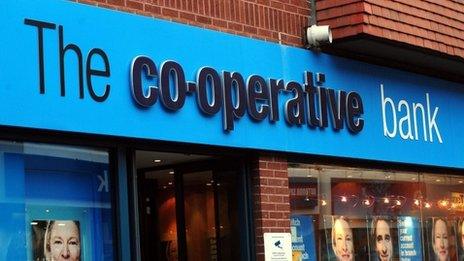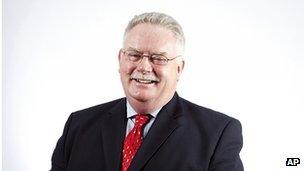Co-op takeovers 'breathtakingly destructive' says review
- Published

Co-op Bank's takeover of Britannia left it with large debts
The Co-operative Group spent too much time on takeover deals that proved "breathtakingly value-destructive", an initial review has found.
Lord Myners' review , externalis highly critical of the group's takeovers of Britannia building society and supermarket chain, Somerfield.
He added it would be "inappropriate and premature" to appoint a new boss of the Group now.
Co-op chief executive Euan Sutherland resigned on Tuesday.
Mr Sutherland's resignation came after it was revealed he had described the Group as "ungovernable" in a recent Facebook post.
Earlier this month details of his basic salary of £1.5m, including a retention bonus for another £1.5m, were revealed.
With pension contributions and other extras, Mr Sutherland would have received £3.66m this year.
'Democratic deficit'
The first stage of the Myners review accuses the Co-op of suffering from a significant "democratic deficit" in which ordinary members have surprisingly weak constitutional rights and a limited ability to influence the group's social mission and activities.
The Britannia building society and Somerfield takeovers had cost the Group billions of pounds and had led to the accumulation of unsustainable debts which undermined its competitive position and severely eroded its capital base, Lord Myners added.
The former Labour City minister was appointed as a senior independent director by Co-op Group chair Ursula Lidbetter in December, to undertake a full review of the entire business.
It followed the collapse last year of Co-op Bank's deal to take over 632 Lloyds Bank branches and the arrest of the bank's chairman Reverend Paul Flowers on drugs allegations.
He was suspended from both the Methodist church and the Labour party and later resigned from the Co-op.
Co-op Group chairman Len Wardle, who appointed Reverend Flowers, was also forced out.

Paul Flowers resigned as Chairman of Co-op Bank last June
Lord Myners' initial report found the Group's three-tier system of elected member representation had "consistently produced governors without the necessary qualifications and experience to provide effective board leadership".
He added this had "massively raised the cost of decision-making and diminished genuine accountability throughout its governance hierarchy".
And he said that while "one member, one vote" had been a core principle of co-operative ownership, at present ordinary members do not have the right to attend Annual General Meetings or to elect or re-elect Group board directors.
Business restructure
The Co-op Group is cutting staff and selling off parts of its business in an effort to save itself but is still expected to post annual losses in excess of £2bn at the end of this month.
Lord Myners' review will recommend that Group board directors should be subject to annual election or re-election by all members and that vacancies should be openly advertised and candidates appointed on merit against clear criteria of skills and experience.
They will also include the creation of a new Group board made up of an independent chair with no previous association or involvement with the Group, six to seven independent non-executive directors, and two executive directors.
Lord Myners said the new, far smaller board would replace the existing 20-strong elected board of directors.
He pointed out he had no power to decide whether his recommendations would be approved.
Lord Myners said the decision to accept the recommendations would most likely "lie in the hands of fewer than 50 elected members" who if they acted together would be able to cast more than one-third of the Group's votes in opposition to them.
He added: "Until the outcome of these constitutional changes is decided, it is my opinion that it would be inappropriate and premature to proceed with the appointment of a new CEO, in view of the risk that, while these governance issues remain unresolved,
"The Co-operative Group will be unable to attract applications from best-in-class retail executives. Confirmation of members‟ readiness to approve radical governance reform will also be essential to reduce current uncertainty among existing key employees."
Separated
In December of last year the ownership structure of the Co-operative Bank was changed and it is now only 30% owned by the Co-operative Group.
A spokesman from the Bank said: "The Co-operative Bank is a separate organisation to The Co-operative Group and has already made significant advances in reforming its governance and leadership.
"The Bank has a separate board with its own Chairman, Chief Executive and a new management team."
- Published12 March 2014
- Published12 December 2013